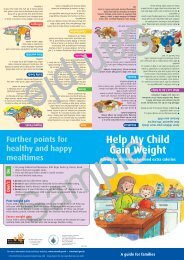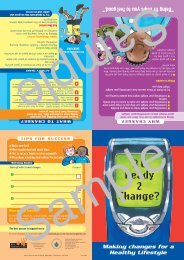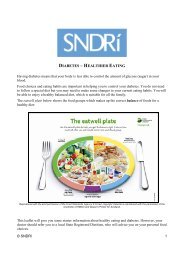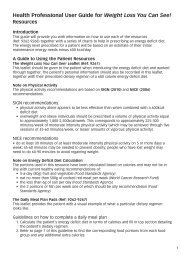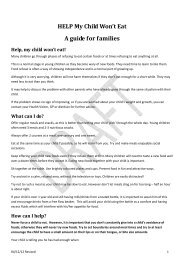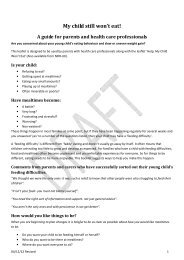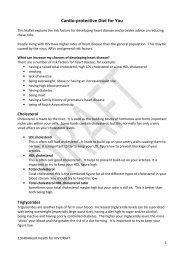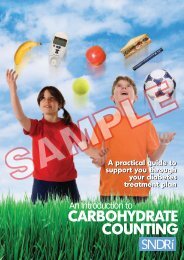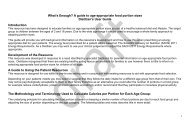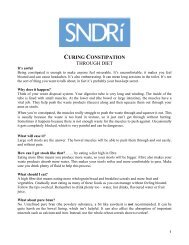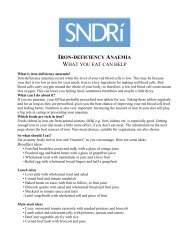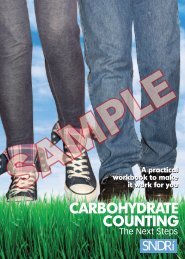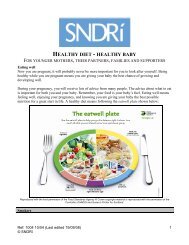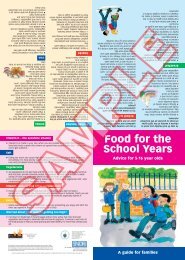Create successful ePaper yourself
Turn your PDF publications into a flip-book with our unique Google optimized e-Paper software.
Thin down the puree with expressed breast milk or formula milk if necessary. It needs to be<br />
quite runny if you start when your baby is just over 4 months. Older babies may manage a<br />
thicker consistency - add baby rice or mashed potato to make solids thicker.<br />
Start with 1 – 2 teaspoons at one feed. Use a plastic<br />
How much should I give?<br />
weaning spoon and half fill it. As your baby learns to take<br />
food from the spoon they will take more. You can then begin to make the puree thicker or<br />
introduce well-mashed foods. Never add solids to a bottle of milk.<br />
Choose a time that is convenient to you and not rushed.<br />
What time of day is best?<br />
It may be best to give some breast milk or formula milk<br />
first to settle your baby until they become used to the spoon.<br />
Offer a second meal when your baby has<br />
When should I begin a second meal?<br />
learnt to feed from a spoon. This may<br />
take a few days for older babies (or 1 –2 weeks if you start soon after 4 months).<br />
Each baby is an individual – so each will be different<br />
Remember<br />
when it comes to feeding. The closer your baby is to<br />
6 months when you begin, the more quickly you can progress to<br />
thicker purees and finger foods than if you wean at an earlier age.<br />
Be guided by your baby and if you need further help with feeding,<br />
contact your health visitor.<br />
Not before<br />
Are there any foods I shouldn’t use?<br />
6 months: foods<br />
with gluten, including bread, pasta and rusks. Also avoid eggs, fish,<br />
shellfish and liver.<br />
Not before 12 months: honey, sugar and salt.<br />
Limit liver to once a week and oily fish to twice a week. Make sure<br />
eggs and shellfish are well cooked.<br />
Until 6 months of age, breast milk or formula milk is<br />
What other drinks can I give?<br />
the only drink that babies need. In very hot weather<br />
bottle fed babies may need a little cooled boiled water. Before weaning breastfeeding babies<br />
do not need extra water, as they will demand more feeds if they are thirsty.<br />
<strong>After</strong> 6 months and when solids are established, some water or dilute, unsweetened, pure fruit<br />
juice can be given from a cup with meals. Tea reduces the absorption of iron and should not<br />
be given to babies and young children.<br />
Vitamins A and D are recommended from 6 months onwards<br />
Should I give vitamins? for breast fed babies. Babies drinking formula milk should<br />
have these vitamins when they are over 6 months old and taking less than 500mls of baby<br />
milk per day. Most children should continue with these vitamins until 5 years old. Check with<br />
your health visitor.<br />
If you are giving your baby a vegetarian diet<br />
Vegetarian or vegan weaning diet<br />
you will need to make sure your baby gets all<br />
the nutrients they need. Vegetarian diets can be high in fibre, and this can lead to low<br />
energy (calorie) intake, and low absorption of some important minerals such<br />
as iron and zinc. Give foods or a drink high in vitamin C with each meal<br />
e.g. tomato, diluted orange juice. Ensure that you baby is growing well,<br />
and having foods rich in iron such as fortified breakfast cereal, pulses (red<br />
lentils, split peas, beans), tofu and green leafy vegetables. Make sure<br />
that you offer at least 2 serving of these foods a day. It is important<br />
that you give the vitamin A and D drops.<br />
If you wish to wean your baby onto a vegan diet you need to take<br />
extra care. A health visitor or paediatric dietitian can give specific<br />
advice on weaning onto a vegan diet. Vegan babies and children may<br />
need extra vitamins especially vitamin B12.<br />
Look inside for examples of foods to give<br />
your baby at each stage. Vegetarian choices<br />
are included in these examples.<br />
Sample<br />
From 6 months you can use weaning foods that contain pasteurised cow’s milk e.g. yogurts,<br />
custards and white sauce. When pasteurised cow’s milk is given, after your baby is 1 year old,<br />
it should not be diluted. Use whole milk (or full fat milk) as it has more vitamins and calories<br />
for your baby. Semi skimmed milk should not be given to children under 2 years of age.<br />
Skimmed milk should not be given to children under 5 years of age.<br />
Not before one year. Breast feed or<br />
When can cows’ milk be given as a drink?<br />
continue with formula milk until your<br />
baby is 1 year old. Follow-on formula milk is not essential but can be given from 6 months if<br />
you wish. Formula milk can be offered from a cup from 6 months.<br />
Whole nuts, including peanuts, may cause choking in children under 5 years. If Mum, Dad,<br />
brothers or sisters have allergy, eczema, asthma or hayfever do not give foods containing<br />
peanuts until your child is 3 years old.<br />
What should I do if my baby will not eat?<br />
DO NOT WORRY. We all have our ‘off’ days and so do babies. Do not force your<br />
baby to eat. If solids are refused, take the food away and give the usual milk feed.<br />
Speak to your health visitor if you are concerned.<br />
What should I do if my baby is constipated?<br />
If your baby is suffering with constipation it is important to ensure that they are<br />
drinking enough fluid. If you are formula feeding give some extra water. Take<br />
care to make up formula feeds correctly. Breast fed babies are less likely to be<br />
constipated if they are feeding well, but occasionally may need some extra water<br />
if the weather is hot or they have a temperature. It is also important for babies to<br />
have a varied diet, including fruit and vegetables, once they are weaned. If the<br />
constipation does not improve, speak to your health visitor or GP.<br />
What about food allergies?<br />
Food allergy is an uncommon condition, but if you think your baby is reacting to<br />
food, go to your doctor or health visitor. If you are advised to exclude some foods<br />
from your baby’s diet, your doctor should refer you to a dietitian.<br />
Contact Person:<br />
Telephone:<br />
The BDA Paediatric Group<br />
is a Specialist Group of<br />
The British Dietetic<br />
Association<br />
The British Dietetic Association,<br />
5th Floor, Charles House,<br />
148/9 Great Charles Street Queensway,<br />
Birmingham B3 3HT.<br />
Fax: 0121 200 8081<br />
e-mail: info@bda.uk.com<br />
www.bda.uk.com<br />
March 2008<br />
Try a little cereal mixed with breast milk or formula milk - if your<br />
Which foods first? baby is under 6 months use gluten free cereals such as baby rice,<br />
cornmeal or millet. You can also try some pureed vegetables or fruit e.g. potato, sweet potato,<br />
carrot, apple or pear. Meat and fish may also form part of the early weaning diet.<br />
Breastmilk or formula milk is all most babies need<br />
When should I wean my child?<br />
until 6 months of age. At 6 months of age, milk is<br />
not enough and your baby will need solids too. The transition of moving from all milk feeds to<br />
starting solid food is known as weaning. If you choose to begin earlier don’t start before your<br />
baby is 4 months (or 17 weeks).<br />
Your baby will begin to show signs that they are ready for solids. These may include:<br />
● your baby can sit up supported<br />
● your baby showing interest in other people’s eating<br />
● your baby appears to be still hungry after increasing milk feeds for a few days.<br />
<strong>After</strong> <strong>Milk</strong><br />
What’s <strong>next</strong>?<br />
Sample<br />
© The British Dietetic Association Paediatric Group 2008 • Design: Room At The Top Design/Illustrations: Jan Smith<br />
Weaning guide for families
From<br />
6<br />
Months<br />
Smooth first tastes<br />
Ideally from 6 months (26 weeks) - BUT no earlier than<br />
4 months (17 weeks)<br />
Start with 1 – 2 teaspoons of food once a day and when your baby<br />
is happy to take more, offer solids twice a day. This may take a few<br />
days or even 1 –2 weeks if you start soon after 4 months. If you<br />
wean closer to 6 months your baby will progress to the <strong>next</strong> stages<br />
more quickly.<br />
On Waking<br />
Morning<br />
Early <strong>After</strong>noon<br />
Evening<br />
Bed-time<br />
Breast or bottle feed.<br />
Baby cereal mixed with breast milk or<br />
formula milk (gluten free baby cereal if<br />
your baby is under 6 months). Finish with<br />
a breast or bottle feed.<br />
Breast or bottle feed.<br />
Vegetable puree e.g. root vegetables:<br />
potato, yam, carrot, parsnip, sweet potato,<br />
broccoli, cauliflower OR fruit puree e.g.<br />
cooked apple, ripe pear, peach, banana.<br />
Finish with a breast or bottle feed.<br />
Breast or bottle feed.<br />
Always wash your hands before preparing<br />
your baby’s meals and keep dishes and<br />
spoons especially clean. Bottles need to be<br />
sterilised.<br />
Moving on to iron-containing foods<br />
Foods high in iron are needed so it is important to move on quickly from<br />
‘first tastes’. Iron-containing foods are meat, fish and pulses (dahl,<br />
beans, lentils, peas). Make up meals with about 1/3 meat/pulses, 1/3<br />
starchy food e.g. rice/pasta/potato and 1 /3 vegetables.<br />
Make purees thicker and give a variety of flavours – savoury as well as<br />
sweet. Use mild spices and herbs for flavour.<br />
Offer 3 meals a day. Your baby will gradually want less milk as more<br />
solids are taken. Start giving some drinks from a cup instead of a bottle.<br />
On Waking<br />
Morning<br />
Lunch<br />
Evening<br />
Bed-time<br />
Breast or bottle feed.<br />
Baby cereal and fruit puree mixed with<br />
breast milk or formula milk.<br />
Breast or bottle feed.<br />
Thicker purees of meat or fish or<br />
pulses/dahl with mashed vegetables and<br />
potato, rice or pasta.<br />
Drink of water in a cup.<br />
Finish with a breastfeed or formula milk in<br />
a bottle or cup.<br />
Sample<br />
Full fat yogurt/milk pudding and fruit<br />
puree.<br />
Breast or bottle feed.<br />
Breast or bottle feed.<br />
Starting soft lumps and finger<br />
foods to learn chewing<br />
Offer finger foods and mashed foods with some lumps. Start with soft<br />
finger foods such as fingers of toast, soft peeled fruits or soft cooked<br />
vegetable sticks. Every baby is individual and some babies may be able<br />
to manage these textures earlier than others. Do not leave your baby<br />
alone in case of choking.<br />
On Waking<br />
Morning<br />
Lunch<br />
Evening<br />
Bed-time<br />
Breast or bottle feed.<br />
Cereal with milk and pieces of soft fruit.<br />
Breast or drink of formula milk.<br />
Minced/pureed meat, flaked fish or<br />
mashed pulses/dahl with mashed<br />
vegetables and mashed potato, rice<br />
or pasta.<br />
Mashed fruit with yoghurt or milky<br />
pudding.<br />
Drink of cooled boiled water in a cup.<br />
Well cooked scrambled egg with fingers<br />
of toast.<br />
OR Pasta with vegetable sauce and grated<br />
cheese.<br />
OR Flaked fish (bones carefully removed)<br />
with mashed potato<br />
and softly cooked<br />
vegetable sticks.<br />
OR Chapatti with<br />
vegetable/dahl curry.<br />
Fingers of soft peeled<br />
fresh fruit for pudding.<br />
Breast feed or drink of formula milk.<br />
Breast or bottle feed.<br />
Time for family meals<br />
By about 9 months of age your baby should be eating mostly the same<br />
foods as your family. Eat together as a family as often as possible. Let<br />
your baby feed him or herself, with your help, even if it means messy<br />
fingers! Offer a wide variety of different foods. Some days your baby<br />
will eat more, some days less. Keep mealtimes fun and enjoyable.<br />
If your baby is hungry between meals offer pieces of fresh fruit, cheese<br />
fingers, crackers, bread or breadsticks. Sugary snacks and biscuits<br />
damage teeth. Frequent drinks of fruit juice, squashes and fizzy drinks<br />
between meals also cause tooth decay. Offer water instead.<br />
Do not add salt to food for babies.<br />
On Waking<br />
Vitamin and iron rich cereals e.g.<br />
Breakfast ideas<br />
Shreddies, Cornflakes or Weetabix mixed<br />
with milk and pieces of fruit.<br />
Bread/toast/chapatti with butter/margarine and<br />
jam/peanut butter.<br />
Hard-boiled egg with toast/chapatti.<br />
Breast feed or drink of formula milk.<br />
Chopped/minced meat, flaked fish with<br />
Evening Meal ideas<br />
potato, rice, pasta and vegetables.<br />
Vegetarian shepherd’s pie, mild curry and<br />
rice/naan/chapatti or casseroles with added chickpeas<br />
or kidney beans.<br />
Pasta shapes with tomato sauce and grated cheese.<br />
Lasagne, spaghetti bolognaise made with soya mince.<br />
Pieces of fresh fruit/stewed fruit/tinned fruit/fruit<br />
crumble and custard.<br />
Drink of water or diluted juice in a cup.<br />
Bed-time<br />
Breast or bottle feed - only if needed.<br />
Sandwich/pitta bread with ham, chicken,<br />
Lunch ideas<br />
tuna, cheese, egg mayonnaise or hummus<br />
and salad.<br />
Pasta with sauce and cheese.<br />
Rice and dahl with vegetables.<br />
Homemade vegetable soup with bread/naan bread.<br />
Omelette with potato wedges and vegetable<br />
slices/sticks.<br />
Baked potato with cheese or baked beans.<br />
Yogurt or milk pudding with pieces of fresh fruit.<br />
Drink of water or diluted juice in a cup.<br />
Sample<br />
Breast feed or formula milk.



